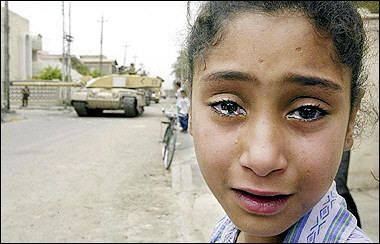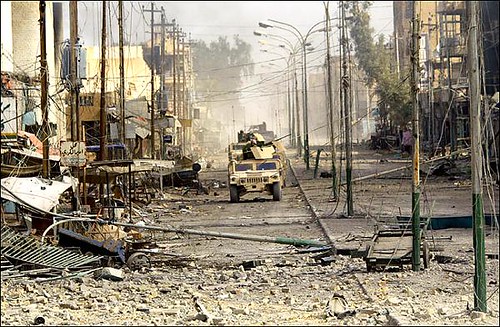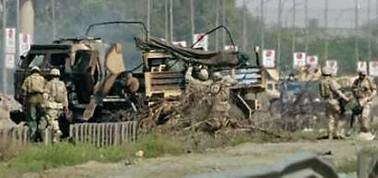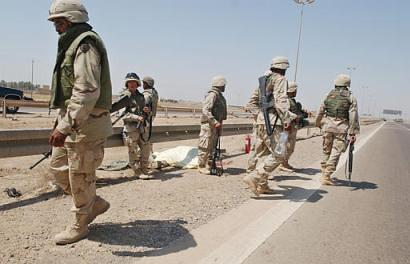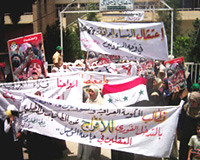Stop Accusing Me of Intellectual Dishonesty
Christopher Snitchens
March 30, 2004
Christopher Snitchens takes to task the anti-war Left for its short-sighted demands for scholarly and political consistency.
More than a decade ago now, with the no-fly zones firmly in place over northern and southern
Iraq, and with the Iraqi Kurds in the north finally beginning to carve out, after many years of brutal oppression, some degree of autonomy, I found myself, thanks to a few embassy friends who will remain unnamed, in an airy sublet in the Village, not far from Lower Manahattan, which, though not war-torn, ought to have been.
Flashing forward. The anti-war Left, unencumbered by memories of the horror of 9-11 (“9 what?” several former colleagues of the Left have asked me on more than one occasion), and apparently unconcerned that the Ivory Tower would, if the Islamofascists had their say, go the way of its twin counterparts, is content to contend that Saddam Hussein never actually met with Osama bin Laden or his henchmen, despite the fact that everyone who believes such meetings took place says firmly that such meetings took place. This is pure cowardice, a failure to make assertions in the face of a mounting threat. “How do you know it is mounting?” such so-called progressives ask. The answer is obvious: how could one not know when confronted with so much confidence that it is so?
The rapport between these first two paragraphs is, I hope, clear. Though I didn’t feel the shockwaves of the first Trade Center bombings on that crisp day in 1993, I know in retrospect that I must have felt them, unlike those Leftists who have no discernible feelings, and who would have been quite happy to allow Saddam Hussein to continue to brutalize his own people. Indeed, it was on that fateful day, eight years before the same miscreants accomplished their fanatical goal, sometime between high tea and happy hour, that I began to realize that unreconstructed Trotskyism was an ideology insufficient to the gathering threat posed by the medieval-minded populations of the world and their festering anger at the success of the West.
I should point out, since it is fashionable for the anti-war set to hurl unthinking accusations of racism and neo-imperialism at any who sit in disagreement, that such medieval mentalities are not confined solely to the Islamic world, though they have there reached, perhaps, their apogee. Indeed, religious sentiment, regardless its source, breeds backward-looking thought, and so it must be done away with, except in the
United Kingdom and the
United States, where monotheism has given moral backbone to the two principle architects of our necessary war against barbarism - Mr. Bush and Mr. Blair.
Of course, the Left will read in these statements about religion a “root cause,” and will go on and on about Muslim anger and the conditions of poverty in Islamic nations, though they know as well as I that all through Europe’s Dark Ages Islam kept alive the light of learning. For centuries, quite literally, while European Christians hacked each other to death, lost their literacy, lost medicine, lost architecture, lost art, the great Islamic civilizations of Northern Africa and the
Middle East preserved Classical learning through the Arabic language. Were it not for the Islamic universities of
Spain and Persia, the Renaissance and indeed the Enlightenment would never have occurred, and I would have had nothing to rebel against during that not so distant time when I believed neo-Marxian thought to be the necessary antidote to colonialism. Since past is prelude, there is no excuse for the failure of Islam to embrace once again the light of learning, science, and
democracy. One might contend - believably, I believe - that only Saddam Hussein had been their downfall. I may be accused of exaggeration. Very well, I stand accused. But I am accused by the supposed humanitarians that lacked the uprightness to destroy a nation in order to save it. Now that Hussein has been deposed and the marshes of Southern Iraq re-flooded, there is no reason to suppose that the Muslim world cannot once again flower with learning and democracy, as it did under the caliphates, minus the democracy.
Lest we forget, George W. Bush had given Saddam an ultimatum, thinking perhaps of Dr. Johnson’s famous words: “Let him go abroad to a distant country; let him go to some place where he is not known. Don’t let him go to the devil, where he is known.” I for one am happy that this devil has been dispatched. That is morality - that it is a good thing is clear as day.
Christopher Snitchens is not related to columnist and raconteur Christopher Hitchens. No, not in any way, shape or form. Not related. To Christopher Hitchens
Stolen from http://www.newamericanempire.org/theimperium/archives/2004/03/000032print.html
